Investing in IPO stocks is a recommendation one cant ignore
A major attraction of IPO stocks is that the initial price can soar many times higher
image for illustrative purpose

Sometimes investors confuse a company's brand with its business operations. In other words, you may love the product, but that doesn't necessarily mean you have to love the stock too
The Indian stock market has emerged as a force to be reckoned with on the global stage. With a market capitalization that exceeded $4.6 trillion as of February, India has a vibrant and dynamic trading landscape. This growth is facilitated by the capital market regulator Securities and Exchange Board of India (SEBI) and markets infrastructure institutions (MIIs) like stock exchanges, depositories, clearing corporations and other stakeholders, which are robust and tech-enabled, supporting digital features like screen-based trading, electronic order routing, and electronic holding of securities, amongst others.
IPO stocks are an investment that is recommended even for people who have yet to become accustomed to stock investing. This is because IPO stocks have the advantage of not requiring too many difficult investment decisions, their prices tend to rise, and the risk of loss is low. In other words, by simply purchasing IPO stocks and selling them at the initial price without thinking, there was an incredible probability of making a profit on 9 out of 10 stocks. Conversely, only one out of 10 IPO stocks lost money at the initial price. Also, one of the major attractions of IPO stocks is that the initial price can soar many times higher.
However, because IPO stocks are so popular, for most stocks, the number of people wanting to buy them is overwhelmingly greater than the number of shares being offered for sale. When it comes to regular stock investing, the most important thing is to identify stocks that will go up. On the other hand, in the case of IPO stock investment, the important question is “how to get through the narrow gate of the lottery and obtain the right to purchase IPO shares.”
“Most of the IPO shares allocated to securities companies are allocated to over-the-counter transactions, and very little goes to people who trade online,” but that is not the case. Recently, securities companies have improved their services for online investors, and many securities companies allocate 100% of their allocation to themselves, and even fewer securities companies allocate about 10% to investors who trade online, and draw lots fairly. Considering this, the correct answer for individual investors who do not have a large amount of capital, especially beginner investors, is to apply for IPO stocks through internet trading and take on the challenge of a “fair lottery” that is not influenced by the amount of funds or trading performance.
The majority of ordinary investors lack the time and expertise necessary to do such in-depth research. Therefore, a low-cost index fund with little tracking error is the ideal option to access stock investments.
Stock markets with positive momentum can attract initial public offerings (IPOs) and plenty of hype. Like most new opportunities, it can be easy to get caught up in the excitement, and IPOs are no exception.
When it comes to investing in IPOs, investors should consider keeping a cautious outlook. Many times in recent years, an IPO with a lot of publicity and hype cratered soon after its opening day. Sometimes investors confuse a company's brand with its business operations. In other words, you may love the product, but that doesn't necessarily mean you have to love the stock too.
One potential problem with IPOs is that many investors might rush in. It might be worth waiting to see how the newly issued IPO shares perform in the market. Or, if you do jump on an IPO, you might want to consider buying shares in small quantities over time rather than going all in at once. People can be excited to invest in these companies, but it's good to keep the potential downside in mind.
When considering a purchase in the secondary market, investors should have a risk management plan in place that states timeframe, entry, take profit, and stop-loss targets, and so on to help keep a cool head, even in unpredictable markets.
Just as with any other investment, it's important to do your own homework, so let's review a few IPO basics—that way education, not hype, drives your decision-making.
Why do private companies go public? There's a variety of reasons. They could be trying to maximize shareholder value, raise capital to invest in the business, or use the shares as currency for a merger or acquisition. IPOs are also one of many ways venture capital and private equity investors cash out their stakes in a company.
The number of companies filing to go public tends to accelerate during strong markets, but there are many factors that go into a company's decision about when, and if, it will file to go public.

